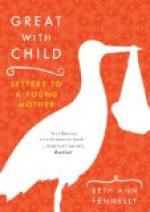The clothes should not be “tucked up” at the sides and foot of the bed with too much care and exactness. For when the bed is once warmed thoroughly with the child’s body, the admission of a little fresh air into it, when he elevates or otherwise moves his limbs, can do no harm, but may do much of good, in the way of ventilation. I deem it important, moreover, to inure children very early to little partial exposures of this kind.
Those mothers who, from over-tenderness, and want of correct information on the subject, pursue a contrary course, and consider it as almost certain death to have a particle of fresh air reach the bodies of their infants during their slumbers, are generally sure to outwit themselves, and defeat their very intentions. For by being thus tender of their children, it often turns out that whenever the mother is ill, or when on any other account she ceases to watch over them—and such times must, in general, sooner or later come—they are much more liable to take cold or sustain other injury, should they be exposed, than if they had been treated more rationally.
I knew a mother who would not trust her children to take care of their own beds on retiring to rest, as long as they remained in her house, even though they were twenty or thirty years old. But they had no better or firmer constitutions than the other children of the same neighborhood.
Hardly anything can be more injurious than covering the head with the bed clothes; and yet some mothers and nurses cover, in this way, not only their own heads, but those of their children. I have elsewhere shown how impure the air is, which is imprisoned under the bed clothes. I hope those mothers who are willing to destroy themselves by covering up their heads while they sleep, will at least have mercy on their unoffending infants.
SEC. 6. Night Dresses.
The grand rule on this point is, to wear as little dress during sleep as possible. Some mothers not only suffer their infants to sleep in the same shirt, cap, and stockings that they have worn during the day, but add a night gown to the rest. No cap should be worn during the night, any more than in the day time. Or if the foolish practice has been adopted for the day, it should be discontinued at night. It is enough for those adults whose long hair would otherwise be dishevelled, to wear night caps, and subject themselves, as they inevitably do, to catarrh and periodical headache. Children’s heads should have nothing on them by night; nor even by day, except to defend them from the rain or the hot rays of the sun.
The stockings, too, should be wholly laid aside at night, unless in the case of those who are feeble, apt to have their feet cold, or particularly liable to bowel complaints. Such may be allowed to sleep in their stockings, but not in those which have been worn all the day.
Indeed, neither children nor adults should ever wear a single garment in the night which they have worn during the day. The reason is, that there are too many causes of impurity in operation while we sleep, without our wearing the clothes in which we have been perspiring during the day-time—and which must be already more or less filled with the effluvia of our bodies.




